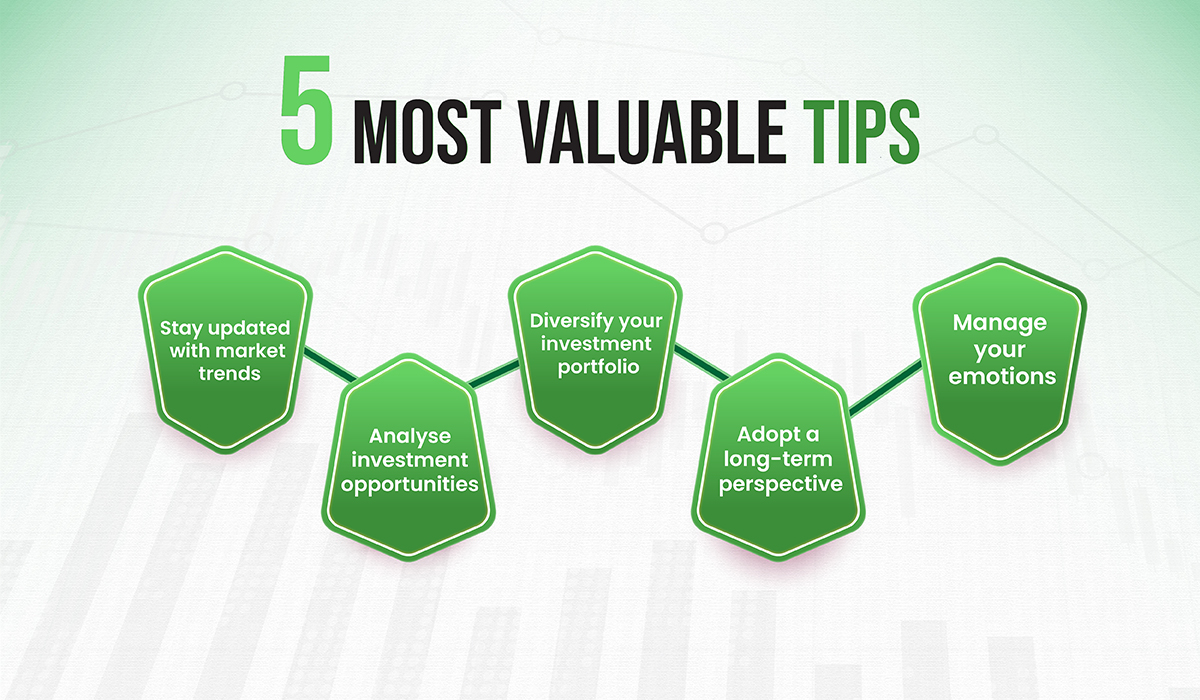5 Tips to Think Like an Investor Before Investing in 2023


INTRODUCTION:
Investing can be a great way to grow wealth and be financially independent over time. However, successful investing requires more than just picking random stocks or following the crowd. To truly thrive in the world of investments, you need to think like an investor and implement that valuable mindset in your investments. In this article, we will explore five valuable tips that will help you develop the mindset of a successful investor in 2023 and beyond, but before diving into the tips we need to know why it is important to think like an investor.
Why is it important to think like an INVESTOR?
Thinking like an investor is a very crucial step for growing your wealth and being financially independent over time. An investor always evaluates all the aspects before investing. In this fast-growing world, where you have enormous options to invest in, an investor needs to be very selective while investing. It is very important to think like an investor and pick the best assets that help you to achieve your financial goals.
5 MOST VALUABLE TIPS:

1. STAY UPDATED WITH MARKET TRENDS:
The first step in thinking like an investor is to stay informed about the latest market trends. This involves actively following the market and analyzing from reliable sources. Focus on major economic indicators, such as GDP growth, inflation rates, and unemployment figures. Understanding how these factors influence the market can help you make informed decisions and spot potential investment opportunities.
2. ANALYSE INVESTMENT OPPORTUNITIES:
Investing is all about identifying promising investment opportunities and making informed decisions. To do this, you need to conduct thorough research on potential investments. Whether you’re interested in stocks, bonds, or mutual funds, gather as much information as possible. Analyze company’s financial health, industry trends, and competitive landscape by fundamental analysis and evaluating demand and supply, and risk management by technical analysis. Evaluate the risks and potential returns associated with each investment option.
3. DIVERSIFY YOUR INVESTMENT PORTFOLIO:
Diversification is a basic principle in investing. By spreading your investments across different sectors or assets, you can reduce risks. Depending on your research and risk tolerance, distribute your funds among stocks, bonds, mutual funds, and other investment vehicles. Diversification ensures that your portfolio is well-positioned for long-term growth and helps shield it from the volatility of any stock or investment.
4. ADOPT A LONG-TERM PERSPECTIVE:
Investing is a great source of generating wealth, but it can not make you rich overnight, you need patience and a long-term perspective for achieving it. in place of short-term market fluctuations, focus on your long-term goals. a well-planned strategy and implementing it also plays a very important role in it. Avoid making impulsive decisions based on short-term volatility. Remember that successful investing is a marathon, not a sprint.
5. MANAGE YOUR EMOTIONS:
Emotions can often cloud your judgment and lead to irrational investment decisions. Successful investors learn to control their emotions, particularly fear, and greed. Stick to your investment strategy even when market conditions are unfavorable. Avoid chasing quick gains or panicking during a market crash or correction. By maintaining a rational mindset by being a disciplined investor, you can make more logical and calculated investment choices.
CONCLUSION
Investing can be a rewarding and profitable endeavor, but it requires more than just blindly putting your money into various assets. To succeed as an investor, you need to develop a certain mindset—a way of thinking that helps you make valuable financial decisions and navigate the complex world of investments. Above tips will help you to think and plan your investments like a successful investor.
FAQs
1. Is it necessary to have a large amount of money to start investing?
No, it is not necessary to have a large amount of money to start investing. Individuals with varying financial resources have access to a wide range of investment options. It is essential, to begin with a level of investment that you are comfortable with and gradually increase it over time.
2. How often should I review my investment portfolio?
It is essential to review your investment regularly to ensure that it meets your financial objectives. Your portfolio should be reviewed at least once every 6 months, or whenever you notice significant changes in your personal or financial situation.
3. Can I think like an investor even if I’m new to investing?
Absolutely! Thinking like an investor is a mindset that can be developed regardless of your experience level. Educate yourself, seek guidance, and practice making informed decisions. Over time, you’ll gain the confidence and skills necessary to think like a successful investor.
4. What are some common mistakes to avoid when investing?
Emotional decision-making, chasing quick gains, a lack of diversification, and not conducting thorough research are some common investing mistakes to avoid. Investing should be done with discipline and knowledge in mind.
5. Are there any investment strategies that can help minimize risks?
Indeed, a few investment strategies can help you in minimizing the risk. As was mentioned earlier, diversification is one of the most efficient methods. Additionally, strategies such as dollar-cost averaging, placing stop-loss orders, and investing in index funds can assist in mitigating the risks associated with investing.
